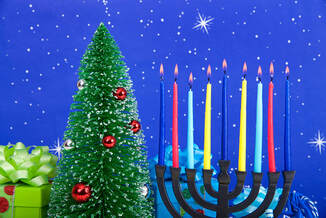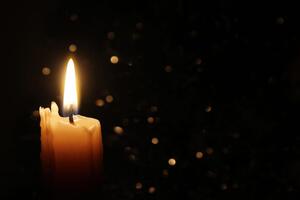
Religious communities are now more open to inviting other faiths to celebrations of their faith, especially during festivals. In many places non-Muslims are invited to break the fast at least once during Ramadan and this week I joined the Jewish community for the lighting of the first Hanukkah candle. The service was in Hebrew so I couldn’t follow the exact wording of the prayers or readings but the service was led by a minister with a lovely singing voice so it was easy to get caught up in the atmosphere and simply enter into the beauty of the chants, remembering that they would have been sung for centuries and that I was participating in a revered and ancient tradition. I also knew the story of Hanukkah, how the Maccabees had cleansed the Temple in Jerusalem from desecration and how oil that should have lasted for only one day did indeed last for 8 days once it had been reconsecrated. Hanukkah is a minor festival and yet an important one as it celebrates religious freedom and, as the minister leading the service said, it gives us the confidence to dream and to believe that our dreams can be fulfilled. So, I was able to get some meaning out of the service.
Part of the tradition is to put a hanukkiah – that is an 8 branched candlestick by a window – with one candle being lit from what is called a helper candle on each day of the 8-day festival. It’s a public witness to the hard -won freedom of the Jewish people to practice their faith without fear of persecution. Religious freedom and respect for religious identity are important human rights but unfortunately ones denied many people in over 20 countries and growing antisemitism in the west has led to some people being afraid to identify themselves as Jewish, even to the extent of not wanting to display their hanukkiah. However, within the community Hanukkah is a festival of light full of family fun, games, and gifts much as Christmas is for Christians. When I worked in teacher education, I often took my students to visit the Jewish primary school some time before Christmas to give them an insight into another kind of denominational school. They were always a bit surprised to find the school alive with rehearsals for hanukkah plays, hanukkah decorations and preparations for hanukkah parties in the same way catholic schools would be celebrating Christmas. At our celebratory meal after Sunday’s hannukah service there was even a hanukkah hat and a few hanukkah jumpers!
Christmas too is a festival of light and it takes place in the darkest time of the year. Recently a Muslim friend asked me if Christians really believed that Jesus was born on the 25thDecember. Well, there may be some people think that, especially if they take the story and the words of the traditional carols sung at this time of the year literally. I once told a class of students that I was rather tired of hearing in some lessons that Jesus had been born on Christmas day i.e.25th December. One student protested! No, Jesus was not born on 25th December – we do not know when he was born. Christmas day is the day we remember the birth of Jesus and celebrate it, but in a spiritual way. In fact, not all Christians celebrate the birth of Jesus on Christmas day. Some do this on 6th January. It’s possible that the date of 25th December was borrowed from the Roman mid-winter celebration of Saturnalia and the feast of Sol Invictus (the Unconquered Sun) to christianise the pagan feast and show Jesus as the true Light of the World.
The hymns and carols of Christmas tell the story of his birth in an imaginative way. The stories of his birth in scripture are not literal or historical documents but myths in that they point to the meaning of Jesus expressed in stories that often reflect Old Testament prophecies. My friend was relieved to hear this and suggested that many Muslims don’t recognise Christmas. Even though they respect Jesus as a prophet, they think that Christians are wrong in thinking Jesus was born in wintertime because the Qur’an tells us quite clearly that Jesus was born in the summer and in the desert.
Within the context of interreligious dialogue can I tell my Muslim friend that he is wrong, and can he tell me that I am wrong to be celebrating Christmas when I do? Can we respect one another’s traditions and accept that as a Christian I am not likely to accept his view and as a Muslim he is not likely to accept mine - and do the differing views take us a bit further in understanding the reality of Jesus? Perhaps but only if we can dialogue about it and surely that’s what we must do.



 RSS Feed
RSS Feed
